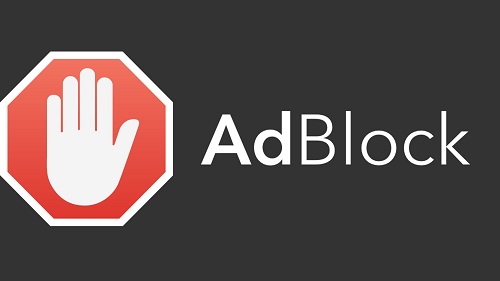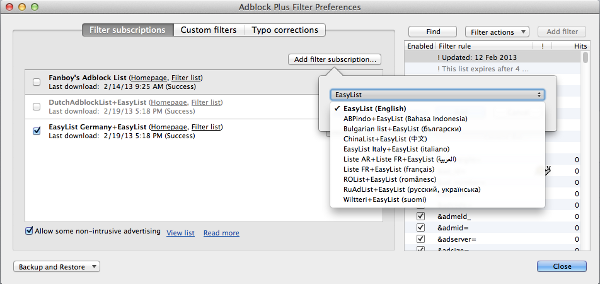Difference between revisions of "Adblocking"
| Line 3: | Line 3: | ||
== History == | == History == | ||
| − | Over the years, adblocking has taken numerous forms. Originally, adblocking could be said to be present on homemade or bootleg recordings of radio and television content. Through the use of various recording technologies, such as VHS and | + | Over the years, adblocking has taken numerous forms. Originally, adblocking could be said to be present on homemade or bootleg recordings of radio and television content. Through the use of various recording technologies, such as VHS and Cassette tapes from the 1970s up through the early 2000s, people could make recordings of their favorite songs and television shows for later playback. Creative playback, mixing, and audio engineering tools of the day would allow people to edit out advertisements and commentary from their recordings. |
| − | + | [[File:Vhs.jpg|frame|left|An early 2000s VHS tape recorder]] | |
| − | However, since the early 2000s, the term has been used most prominently to refer to technologies which allow one to block online advertisements from both websites and streaming video. | + | However, since the early 2000s, following the adoption of the internet in mainstream society and everyday life, the term has been used most prominently to refer to technologies which allow one to block online advertisements from both websites and streaming video. |
One of the earliest known examples of this latter type is the Firefox extension Adblock. Developed by Henrik Aasted Sørensen, Adblock was launched in 2002 as one of the first Firefox extensions. It allowed users to maintain a list of web addresses that the web browser would be prevented from loading - thus blocking the ad from being displayed on a given website. Over the years, many more adblocking technologies would be developed for a variety of different web browsers - including the successor to Adblock, Adblock Plus.<ref>http://www.businessinsider.com/interview-with-the-inventor-of-the-ad-blocker-henrik-aasted-srensen-2015-7</ref> | One of the earliest known examples of this latter type is the Firefox extension Adblock. Developed by Henrik Aasted Sørensen, Adblock was launched in 2002 as one of the first Firefox extensions. It allowed users to maintain a list of web addresses that the web browser would be prevented from loading - thus blocking the ad from being displayed on a given website. Over the years, many more adblocking technologies would be developed for a variety of different web browsers - including the successor to Adblock, Adblock Plus.<ref>http://www.businessinsider.com/interview-with-the-inventor-of-the-ad-blocker-henrik-aasted-srensen-2015-7</ref> | ||
| Line 25: | Line 25: | ||
===User Privacy and Control=== | ===User Privacy and Control=== | ||
| − | [[File: Blockpref.png|200px|frame|Adblock Plus preferences screen]]Although adblocking software allows users to block all ad-related content on any given webpage, it also allows users to filter ads more specifically to their liking. Users may set their own preferences for what ads they would like to see or not see on a specified webpage. In this way, adblocking software attempts to remediate advertiser woes regarding lack of publicity of products and services. This also gives users of the software options to better tailor webpages and any corresponding ads to their personal preferences regarding shopping habits, privacy, and website use of personal data. Additionally, these options not only give users more control over what ads they do and don't see on webpages, but it also give users options to modify actions that can be taken on the webpage. These more advanced options include enabling keyboard shortcuts, choosing which data directories the software should store the data it gathers in, and the ability to modify subscription and notification preferences. <ref>https://adblockplus.org/preferences</ref> | + | [[File:Blockpref.png|200px|frame|Adblock Plus preferences screen]]Although adblocking software allows users to block all ad-related content on any given webpage, it also allows users to filter ads more specifically to their liking. Users may set their own preferences for what ads they would like to see or not see on a specified webpage. In this way, adblocking software attempts to remediate advertiser woes regarding lack of publicity of products and services. This also gives users of the software options to better tailor webpages and any corresponding ads to their personal preferences regarding shopping habits, privacy, and website use of personal data. Additionally, these options not only give users more control over what ads they do and don't see on webpages, but it also give users options to modify actions that can be taken on the webpage. These more advanced options include enabling keyboard shortcuts, choosing which data directories the software should store the data it gathers in, and the ability to modify subscription and notification preferences. <ref>https://adblockplus.org/preferences</ref> |
== References == | == References == | ||
Revision as of 00:31, 5 April 2016
Adblocking or Ad blocking is a term used to refer to a set of technologies that block ad-related content from a given host medium, most frequently websites. This advertising usually exists in the form of pop-ups, banners, and embedded videos that are presented to an end-user upon navigation to a given website or media-stream.[1]
Contents
History
Over the years, adblocking has taken numerous forms. Originally, adblocking could be said to be present on homemade or bootleg recordings of radio and television content. Through the use of various recording technologies, such as VHS and Cassette tapes from the 1970s up through the early 2000s, people could make recordings of their favorite songs and television shows for later playback. Creative playback, mixing, and audio engineering tools of the day would allow people to edit out advertisements and commentary from their recordings.
However, since the early 2000s, following the adoption of the internet in mainstream society and everyday life, the term has been used most prominently to refer to technologies which allow one to block online advertisements from both websites and streaming video.
One of the earliest known examples of this latter type is the Firefox extension Adblock. Developed by Henrik Aasted Sørensen, Adblock was launched in 2002 as one of the first Firefox extensions. It allowed users to maintain a list of web addresses that the web browser would be prevented from loading - thus blocking the ad from being displayed on a given website. Over the years, many more adblocking technologies would be developed for a variety of different web browsers - including the successor to Adblock, Adblock Plus.[2]
Recently, adblocking technology has seen development in DVR technology as well. In 2012, Dish network began bundling their Hopper DVR with an ad-skipping feature that allows users to bypass advertising on their prerecorded programs. This particular technology led to a wide variety of lawsuits that are still in the process of being resolved. For the moment however, various court rulings have found this technology to be perfectly legal - to the incensed chagrin of television networks nationwide. However, this has not stopped certain networks from threatening to drop their coverage for the company if such technologies aren't significantly curtailed for their content - which Dish has typically acquiesced to.[3]
Ethical Implications
Businesses and Advertising Revenue
The biggest and most obvious of the ethical issues surrounding adblocking are those of it's economic impact to advertisers. The argument largely comes down to exactly how valuable users of adblocking software are to a given advertiser.
Adblocking is now a business. Websites are also used as business tools. People need ads on their page if they are to keep their site running, and have traffic directed to their site. For example, searching Google, the first few results are usually ads. Companies pay for this, and expect to get more commerce if their sites are first in the search. Yet with adblocking, their money is going to waste. To combat this, companies are making their advertisements less annoying. Strategies like native advertising and sponsored content seek to provide advertisements that users may enjoy or more freely interact with. Erik Martin, a manager at Reddit explains the type of ads he avoids on his site. "We are all frustrated and upset when we go to a quality publication and see ads for flat belly diets or pop-under ads". This is one of the motivating factors that compels people to use adblocking tools. Users will be deterred from the site if they are annoyed by the ads. There must be a balance of ads, varying the levels of how 'obnoxious' they can be.
Till Faida is president of Adblock Plus, and believes adblocking software is a cause and a business. Faida claims approximately 6% of web users use the software. Those who don't often pay for services to block ads. For example Spotify, originally free, can be upgraded to Premium to avoid ads. While that 6% uses adblockers, many websites lose up to 8% of their audience, which hurts not only the ad providers, but the actual website. Adblock Plus attempts to aid in the advertisers goals for successful ads. Adblock Plus charges ad providers to not only un-block ads, but to approve ads that they will not block. They call this the 'Acceptable Ads' program, and it is not easy to be a member of.[4]
On the one hand, the argument can be made that those who use adblocking software are disruptive to a given advertiser's revenue stream - if they don't see your ad, they can't purchase what your advertising, or even know that your company exists in case they want to buy a product that you sell in the future.[5]
On the other hand, there is the notion that people that use adblocking software represent a large portion of consumers who see advertisements, but will never get converted into paying customers, and so have a net neutral impact on the advertiser and their various subsidiaries.[6][7]
User Privacy and Control
Although adblocking software allows users to block all ad-related content on any given webpage, it also allows users to filter ads more specifically to their liking. Users may set their own preferences for what ads they would like to see or not see on a specified webpage. In this way, adblocking software attempts to remediate advertiser woes regarding lack of publicity of products and services. This also gives users of the software options to better tailor webpages and any corresponding ads to their personal preferences regarding shopping habits, privacy, and website use of personal data. Additionally, these options not only give users more control over what ads they do and don't see on webpages, but it also give users options to modify actions that can be taken on the webpage. These more advanced options include enabling keyboard shortcuts, choosing which data directories the software should store the data it gathers in, and the ability to modify subscription and notification preferences. [8]References
- ↑ https://en.wikipedia.org/wiki/Ad_blocking
- ↑ http://www.businessinsider.com/interview-with-the-inventor-of-the-ad-blocker-henrik-aasted-srensen-2015-7
- ↑ https://en.wikipedia.org/wiki/Hopper_(DVR)
- ↑ Mitchell, Robert · (2014-01-15) · Ad blockers: A solution or a problem? · work · Computer World · 2016-03-28
- ↑ Fisher, Ken · (2010-03-06) · Why Ad Blocking is devastating to the sites you love · work · Ars Technica · 2013-10-26
- ↑ Chappell, Richard · (2010-03-09) · Does Ad Blocking Hurt Websites? · work · Philosophy, etc. · 2015-06-17
- ↑ Robles, Patricio · (2010-03-08) · Is Ad Blocking Really Devastating to the Sites You Love? · work · Econsultancy · 2015-06-17
- ↑ https://adblockplus.org/preferences


